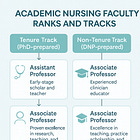Some of the most influential people in my career have been my preceptors—both as a registered nurse and later as a nurse practitioner. These were the clinicians who took me under their wings, challenged me to grow, and created safe, supportive environments where I could learn deeply and practice safely. I’m still in touch with many of them today (Hi Lauren, Mary, and Mikes!), and I carry pieces of their guidance with me into every clinical decision I make and every student I mentor.
Precepting future nurses and nurse practitioners is one of the most impactful ways to give back to our profession. If you’ve ever had a great preceptor (hopefully you’ve had at least one!), you know how invaluable their guidance was in shaping your clinical practice. And if you’ve ever had a not-so-great one, you really understand how much of a difference a good mentor can make.
For those of us working as nurses or nurse practitioners, the responsibility to train and support the next generation isn’t just a duty, it’s an opportunity.
Here’s why you should consider stepping into the role of a preceptor:


Strengthen the Future of Our Profession
Whether you’re precepting a nursing student, newly licensed RN, or nurse practitioner student, your guidance helps build a stronger, more competent healthcare workforce. Registered nurses and nurse practitioners alike benefit tremendously from hands-on clinical training in real-world settings—especially when that training is led by clinicians who are thoughtful, skilled, and engaged.
With ongoing workforce shortages, particularly in advanced practice roles, preceptorship is critical and high-quality clinical training is essential for preparing competent and confident practitioners. Many nurse practitioner students struggle to secure clinical placements, which can delay graduation and impact workforce entry. By precepting, you are actively contributing to the development of skilled, compassionate healthcare professionals who will shape the future of healthcare.
Sharpen Your Own Skills
Teaching is one of the best ways to learn while also inviting you to reflect more intentionally. When you explain clinical reasoning, walk through differential diagnoses, demonstrate procedures, or guide prioritization at the bedside, you’re reinforcing your own knowledge. Students ask questions that keep you on your toes and force you to revisit the latest evidence-based practice, guidelines, and evolving standards of care. Precepting helps you stay sharp, current, and reflective about your own approach to care.
It’s also OK to admit when you don’t know the answer yourself! Sharing struggles builds rapport and trust while reducing stigma. This can also spark richer clinical conversations and create space for shared problem-solving, especially around tough cases, ethical dilemmas, or communication challenges.
Give Back in a Meaningful Way
Think back to your own training. Who helped you become the nurse or nurse practitioner you are today? For many of us, a handful of memorable mentors made all the difference. Precepting allows you to pay that forward and be that person for someone else. Your mentorship may help a student develop confidence, make sense of clinical decision-making, or feel seen and supported in a system that often feels overwhelming.

Enhance Your Leadership and Teaching Abilities
Precepting isn’t just about teaching, it’s about modeling professionalism, communication, teamwork, and clinical judgment. These are core leadership competencies, whether you work in the ICU, primary care, a specialty practice, or academia. Precepting refines your ability to guide others, provide feedback, and lead by example—skills that serve you well across all aspects of your career.
When preceptors model inclusive teaching, clear communication, and professionalism, it elevates the expectations across the team. You demonstrate that mentorship and collaboration are part of the job, not extra. This builds mutual respect and trust among peers, especially when others see you investing in students while still delivering excellent patient care.
Professional Recognition and Potential Benefits
Many healthcare systems, professional organizations, and academic institutions recognize preceptors in meaningful ways. Some offer continuing education credits (CEs/CMEs), formal awards, or letters of appreciation. Others provide access to faculty development opportunities and library/scholarly resources, academic titles, or networking connections. While these incentives shouldn’t be your only motivation, they reflect the high value placed on this important role.
Shape the Kind of Provider You Want to Work With
Every time you mentor a nurse or nurse practitioner student, you help shape the kind of colleague and future provider you want to practice alongside. When you emphasize compassion, accountability, clinical reasoning, and curiosity, you are instilling values that positively influence patient care and team dynamics. One day, your student might be the one covering your patients, leading your unit, or caring for your own family members.

Ready to Precept? Here’s How to Get Started
If you’re a nurse interested in precepting new graduates or students, talk with your nurse manager or clinical educator; many hospitals have formal processes for onboarding RN preceptors. For nurse practitioners, reach out to local nursing schools, professional NP organizations, or national preceptor networks. Many programs are actively seeking clinical partners and will provide training, resources, and support.
Precepting is one of the most fulfilling and generous ways to contribute to our profession. It requires time, presence, and patience, but the impact is lasting. The next generation of nurses and nurse practitioners needs mentors who are passionate, engaged, and willing to share their knowledge and perspective.
If that sounds like you, consider stepping into the role. Our profession will be stronger because of it.
Are you already a preceptor? What do you love about it, and what advice would you give to someone considering it?

Looking for more reads on career, leadership, or mentorship? Explore past features here:
Thanks so much for reading! Plan of Care is a newsletter on career, leadership, and wellness—designed especially for women in healthcare. If you found this post meaningful, give it a like, comment, or share with a friend so more people can find it too. Your reflections and reactions help keep this space real and connected. And if you haven’t already, subscribe below so you never miss a newsletter.






